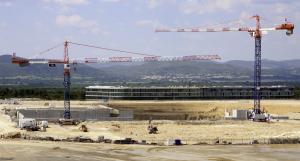With its layer of soft soil removed, the ITER Assembly Hall work site looks a lot like the surface of an alien world. Fine white dust and sharp debris cover the ground. Methodically boring holes deep into the substratum, a lone, insect-like drilling rig adds to the illusion. With a bit of red in the sky it would be easy to believe we were walking on Planet Mars ...
Located adjacent to the temporarily deserted Tokamak Seismic Pit, the Assembly Hall area is the site of the latest construction campaign on the platform. This 60 metre by 100 metre rectangle of earth will host the 57-metre-high edifice in which ITER components will be assembled prior to their installation in the tokamak.
As a follow-up to the scrapers, excavators and dump trucks that removed some 10,000 m³ of soil in three weeks, the drilling rig is carrying out "soil investigation." Long drill bits are being pushed as deep as 7 metres below the surface in order to identify possible discontinuities or cavities created by water erosion (karsts).
The rig will drill a total of 500 holes, collecting and transmitting data to the Engage/Fusion for Energy/ITER Organization team that manages the project. Geologists will then assess the rock profile and determine what treatment should be applied.




